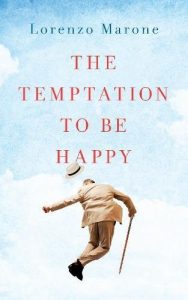Published by Oneworld 5 October 2017
272pp, hardback, £12.99
Reviewed by Zoë Fairbairns
‘An old harridan’ is how ageing Neapolitan widower Cesare thinks of Rossana, whom he pays for sex. She’s got moles and spots and stretch marks, but she’s cheerful enough and she serves her purpose. It dawns on Cesare that one of the hazards of being with a prostitute for too long is that: ‘You forget the preambles, the preliminaries, good manners, kindness, all the things you need to get a “normal” woman into bed.’ So he asks Rossana out to dinner and they become friends.
It’s one of a series of poignant encounters between Cesare and the world outside his retirement flat. Inside it, he spends too much time resenting his late wife’s infidelity. (He was unfaithful to her too, but that’s different.) He regrets his bodily decline – floppy flesh, proliferating liver spots, trembly hands and unreliable water works. He remembers unattainable women from his past, and considers the relative merits and demerits of the different forms of death that may lie in wait for him.
Cesare has too much time on his hands and, at 77, not enough time left. It’s a predicament that will be recognized by many readers in or near his age group. He is irritated and embarrassed by his grown-up children – his son is gay, his daughter a workaholic. He resents their interference in his life, yet feels entitled to their care and support. He loves his little grandson but doesn’t appreciate being expected to collect him from school in order to accommodate his daughter’s lifestyle.
His neighbours too are a mixed blessing: a man who used to be Cesare’s friend has become a near-recluse, an old woman with too many cats has personal freshness issues, and a younger woman who is, Cesare believes, a victim of domestic violence, refuses to do as he advises and report the matter to the police.
Amid all this, Cesare tries to be happy. There are moments of touching eccentricity – he likes going to art exhibitions but only if there is free food to alleviate the boredom. There is tenderness too – the day when he takes his grandson to the fair and almost loses him, the night when he shares his bed with his daughter, not for any incestuous purpose but for mutual comfort and support.
Always on the lookout for meaning, Cesare is quick to turn everyday incidents into platitudes, whether it’s: ‘Old age helps you to accept some uncomfortable truths’ or: ‘The older you get, the more you lose your sweet tooth’ or: ‘When you’re old your dreams are used up’ or: ‘If you are born one way, you can’t die another way, you spend a lifetime deluding yourself that you’ve changed direction, and at the end you discover that the shortcut led you straight back to the path you were on before.’ Too many of these grandiose pronouncements are asserted rather than explored.
I don’t speak Italian and so can’t comment on the quality of Shaun Whiteside’s translation; it may be true to the original when Cesare says, ‘A tear slips down my face unnoticed,’ but I can’t help wondering how a first-person narrator can describe something he hasn’t noticed. And the use of verb tense is odd, sometimes using the present tense to describe something that has happened in the past and sometimes not.
Awaiting surgery at the end for what may be a terminal condition, Cesare gives in to his temptation to be happy by identifying small sources of joy and satisfaction from his past life: the smell of a newborn baby, bicycle bells, houses by the seaside, old songs that take your breath away, the sound of a bubbling coffee pot, dogs that listen to you. It’s an appealing list, one which tempts the reader to start compiling their own, as the anaesthetic kicks in and the novel ends.

